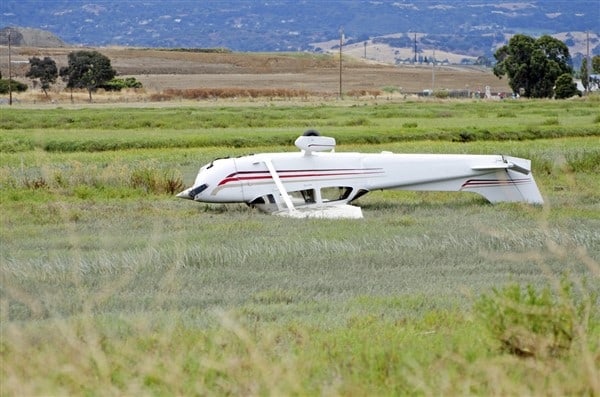Sudden Landing? Remember TWIT
Improving on "engine out" training

Aviation is fraught with acronyms. There are so many acronyms that it is humorous to think the government still thinks they are a memory solution instead of the problem. I hate to add one more, but TWIT is one that may cause an unfortunate event in your life to turn out to be a good story instead of a tragedy. It is the word to remember should your (single) aircraft engine quit. You know, when the heat pump stops heating, when the cooling fan stops cooling, and/or when the roar of the engine that has always been your security blanket leaves nothing but silence ringing in your ears, uncovering your naked fear.
More than twenty years ago I was viewing the remains of an upside-down C-150 in a bean field with a couple guys from the Sheriff’s Department, when a civilian turned up. He was a lanky guy in a black suit with a camera slung across his shoulder. He asked me if I was the party that had left the airplane in this condition, and I admitted that I was the culprit. He said he was not only the undertaker in Paris, Illinois, but the newspaper photographer too, and when he gets a call like the one he got this morning, he didn’t know if he’d be taking pictures or measuring the body. With a grin, he pulled out a tape measure. “Looks like its only pictures this morning,” he said.
The saving grace of TWIT
I’ve had a long time to think about that and decided your early “engine out” training, as good and thorough as it may have been, could be improved upon with TWIT. Any engine out practice is good because if and when it really happens, you don’t need the tension of suffering the sensation for the first time. Few of us do first-time experiences well. So it is nice when you find yourself gliding around up there, sans engine, to have done it a few times before.
Everyone knows the first thing to do, which is to trim best glide speed. Don’t know it? Well, anything in the vicinity is okay. The idea, of course, is to give you the most time aloft for the altitude you are carrying. The reason that is important is that some prayers take far longer than others to complete. And if you happen to be one of those people who feels the need to pray with your eyes closed, well, you don’t want to waste all the glide time left with your eyes closed. It is a good idea to take a look at the terrain.
Trim
So the first letter to TWIT is for Trim, which hopefully gets you somewhere in the neighborhood of best glide. Your airspeed will be about 65–75, depending on the airplane. Our father…
Your flight instructor thought the next important thing to do was find a field to land in. With all due respect, that may not be the best idea. If you can hit a particular field from 5,000’ you are a better pilot than I am. You may pick the best field in your range of vision, but actually being able to hit it from altitude takes a lot of practice that we don’t generally work on. (Well…maybe the astronauts.)
My experience is, you will pick a field, and then see a better one as you get lower, and then a better one when you get lower than that. What makes it good is your ability to land on it, not its humongous size. It only takes a few hundred feet to land an airplane and you will find most fields at least that long. It is far more important to be landing into the wind so that length of field works. It is also nice to land without hitting anything. It is cheaper to buy a quarter acre of corn from a farmer than have to pay for his custom and recently rebuilt outhouse, which his insurance company will value in the tens of thousands of dollars.
Wind
So the second letter of TWIT is Wind. The first of the two turns you are going to make is the turn to base. You need to be adjacent to the wind. You probably know the wind direction, at least generally. If it is, for example, south, then turn east or west. If it is west, turn north or south. Which direction you turn will be decided on which direction has the best fields and the least structures. You don’t need much of a field, but when it comes to choosing one, the more options you have, the merrier.
If you are headed for a town or city, use some of that glide time to make a 180. A long walk out is better than hitting an unmovable object. Hopefully this is going to be the longest base leg you have ever flown. It will give you time to check your drift and verify the wind direction and speed. You might even stumble across a landing strip, if your GPS hasn’t already found one for you. If the wind is left, you are on a left base. If the wind is right, you are on a right base.
Initiate
You don’t pick your field until you see one that fits your sight picture for turning final. Few of us could hit a field from 5,000 feet, but all of us can hit the runway when turning final (well, almost all of us). If you are on left base, you are looking for the field on your left. If you are on right base, you are looking right. When the sight picture is what you are used to seeing, make your turn to Initiate the landing, which is the third letter to TWIT. It is time to get your flaps and wheels down if the wheels are retracted. (Shame on you if you did either of these things on that long base leg glide you were on.)
Talk
No second guessing at this point. It is time to congratulate yourself on getting from way up there to way down here without having done anything foolish, and you can already hear yourself telling a story about your successful off-field landing. Now that you are kicked back and gliding to final, it is a good time to call ATC, FSS, or perhaps your Maker, and let them know where they may find you, while you still have a little altitude left. You may have already done this earlier when you tuned your transponder to the emergency code, but it wouldn’t hurt to call in again, just to prove you can still talk without stuttering. I can speak here from experience — the last thing on your mind when your engine quits will be the radio. That’s why TWIT ends in Talk. You may be comfortable enough, or have enough presence of mind, to actually talk with someone other than yourself, once you have the field made.
Next time your engine gives up the ghost and you have already run through all the nasty words you can think of, try yelling TWIT to yourself. It may help you get down to terra firma safely.
Related articles
Tales From the Oily Side
Starting a business isn't for the faint of heart!
Oil Viscosity
What is viscosity & why does it matter?
Pre-Buy Samples: The Art of the (Craigslist) Deal
Take an oil sample before you buy!
Which Oil is Best?
As we like to say: oil is oil!







